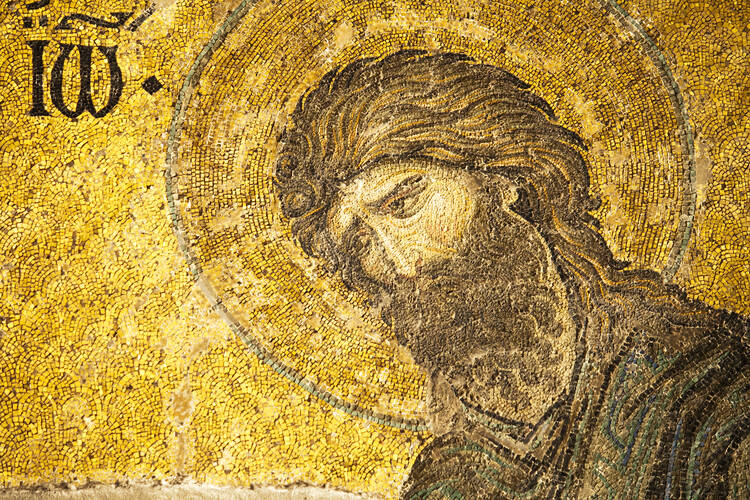A Reflection for the Second Sunday of Advent
Find today’s readings here.
John the Baptist appeared in the desert
proclaiming a baptism of repentance for the forgiveness of sins.
People of the whole Judean countryside
and all the inhabitants of Jerusalem
were going out to him
and were being baptized by him in the Jordan River
as they acknowledged their sins.
John was clothed in camel’s hair,
with a leather belt around his waist.
He fed on locusts and wild honey.
And this is what he proclaimed:
“One mightier than I is coming after me.
I am not worthy to stoop and loosen the thongs of his sandals.
I have baptized you with water;
he will baptize you with the Holy Spirit.”
I have a friend, a Jesuit priest, who used to complain when he was younger whenever he would hear people refer to him as “Father What-A-Waste.” (The passage of time has saved him from such an unhappy fate, as I remind him now and then.) He didn’t like being called that, or at least said he didn’t, not just because it objectified him but because it bespoke a presumption that celibacy and religious life are only for people not attractive enough to compete in a world of dating and marriage. But he also had a funny and somewhat shocking story to tell: When he was a novice, he mentioned his complaint to a fellow Jesuit, who laughed and sent him to look up the reasons the early Jesuits had for rejecting candidates—as reflected in the Jesuit Constitutions and Complementary Norms.
And there it was: A potential impediment to admission was “in regard to the exterior, a lack of bodily integrity, illnesses and weakness, or notable ugliness” (No. 185).
Harsh. Way harsh. And why even say it? Well, one presumes that the early Jesuits felt that ugliness didn’t attract people, and evangelists need to be attractive. You can’t spread the good news if the first thing people notice when they meet you is that you’re as homely as a hedge fence, and you can’t convince anyone to turn away from sin when you’re as ugly as it.
Today’s Gospel reading gives the lie to that presumption, though. Before we even meet Jesus, we meet John the Baptist, who lives in the desert, is “clothed in camel’s hair, with a leather belt around his waist” and “fed on locusts and wild honey.” If we presume he was a Nazirite (from the description in Lk 1:15), he also would never have shaved. The image makes me think of Tom Hanks’ character in “Castaway,” a dirty, hairy dude with a bad wardrobe. Maybe not someone to bring home to mom and dad.
John the Baptist knew that God speaks most clearly through the gritty and the humble.
And yet Mark tells us in today’s Gospel that “People of the whole Judean countryside and all the inhabitants of Jerusalem were going out to him.” In John’s Gospel, Jesus comments that “He was a burning and shining lamp, and you were willing to rejoice for a while in his light” (Jn 5:35). The Gospels even recount arguments between the disciples of Jesus and those of John the Baptist over who is greater (John, obviously, picks Jesus). Clearly, John the Baptist was nevertheless very attractive to people. What’s going on here?
The truth is attractive. John the Baptist speaks the truth, and they come flocking to him. He doesn’t seek glory for himself—in fact, he accepts that he must become less so that Jesus can become more. And he preaches not for his own gain, but to proclaim a future wonder just being born as Jesus begins his ministry. So his vehemence and the force of his message—come forth and confess your sins, because the kingdom is at hand—come through clearly and effectively. Good news about the future and forgiveness while you’re at it…not a bad deal.
We see that so often today, both in popular media and on the local level: the slick and clever message that doesn’t stick, doesn’t last; the preachers whom the writer Katelyn Beaty calls “celebrities for Jesus,” who are looking to make a buck and end up hurting Christians—and losing their way completely.
But then we look at the events we commemorate in the season in which we are now fully engaged: the Christ Child about to be born to the least likely of people in the most humble of circumstances. There’s no reason to be drawn to that person either, on the surface of it—and yet he attracts shepherds, kings, wise men, angels. And John the Baptist himself, eventually, someone who knew that God speaks most clearly through the gritty and the humble. That’s hot.








